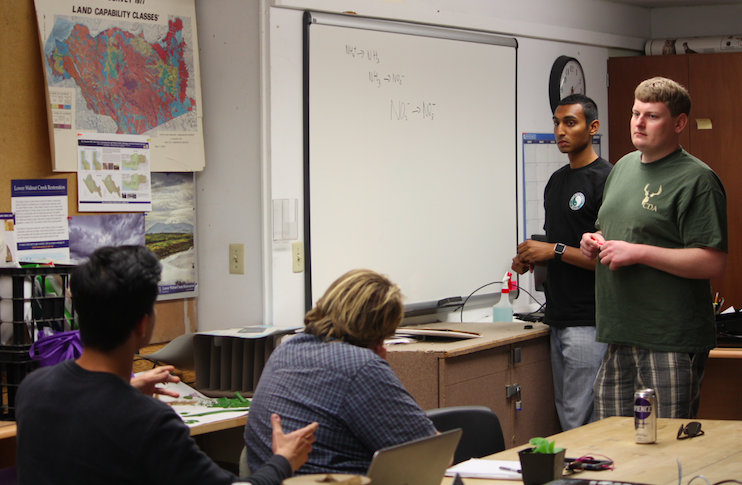DVC’s student-managed “farmscraper” to debut soon
From left to right, Younghwan Kim, Gregory Arganda, Devin Virassammy, and Ryan Gilardy discuss the Vertical Farm Project. In just a few years, Diablo Valley College will become home to its very own student-managed vertical farm. Alberto Chang/The Inquirer
November 6, 2016
A fantastical demonstration of horticultural technology is to debut on campus soon.
In just a few years, Diablo Valley College will become home to its very own student-managed vertical farm; an agricultural triple threat that will serve as an organic food provider, a research facility, and a prestigious reason for attendance.
The idea sprouted in early 2016 when two of the college’s student-run organizations—the horticulture club and the chemistry club—were contemplating possible collaborations. With innovation in mind, they asked a question that would kickstart an ambitious project: Why not go to where the future of agriculture is?
Though by name they counter common sense, vertical farms are anything but unfeasible. And, as of late, we are seeing a progressive shift from traditional farms to them. In general, the same set of ingenious steps make them all work: Farmed fish consume in-tank algae, fish waste is then produced, nitrates from waste mix with the water, and nitrated water is utilized for outside-plant and in-tank algae fertilization. This cyclical system, called aquaponics, allows for crops to be readily grown in stacks instead of on horizontal plots of soil. And depending on their designs, “farmscrapers” can reach heights of dozens of feet.
The chief reason to get excited about them, says Chemistry Club Public Relations Officer Chelsey Froh, is their ability to revolutionize how we get our greens. If you want to give it a term, call it “urban farming.”
Because vertical farms take up diminutive spaces they can be practically built within any urban area of high-population density. Consequently, distances between consumers and their food sources are radically curtailed, yielding two wonderful outcomes: Eating organic is made easier and environmentally unfriendly methods of cargo transportation are seriously reduced.
One purpose of the campus’s forthcoming vertical farm will be to make it easier for students to eat organic, genuinely unaltered foods, all while knowing that that many less greenhouse gasses were emitted in the delivery process. It is even possible that, as Chemistry Club President Devin Virassammy, says, a consortium with the Culinary Arts Department could be made. If such an association was set up, Diablo Valley College would be made nonpareil by its incorporation of home-grown and environmentally friendly produce into its cafeteria.
The other envisioned upshot is the educational potential.
The farm will be built in the Horticulture Department’s greenhouse where, upon completion, it will serve as a research facility for students to engage in scientific exploration. According to Chemistry Club Treasurer Ryan Gilardy, it is even likely that “The project will act as a platform to conduct research that can be published.”
In elaborating for Gilardy, Horticulture Club President Peter Swenson, adds that, because research is a collaborative endeavor, it could very often culminate in co-authored publishings between professors and students. The realization of such a prospect would distinguish the college as a research institution and positively add to its renowned reputation of being a top transfer school.
But right now, as with anything bound for success, the focus is strongly on the nuts and bolts. “The ultimate goal of this project is to build a functional, sustainable vertical farm,” says Virassammy. And because the farm is totally student-overseen, there is as much ongoing, in-progress planning as there is excitement.
Technicalities like how to implement an irrigation system, how to filter fish-killing chloramines from the water, and, adorably, what fish to farm, are all undergoing thoughtful consideration.
So far, there have been a select few consistently dedicating their time to the construction of the eco-friendly setting, including the club representatives mentioned above. In their own words, however, “Any student attending DVC is allowed to join the Vertical Farm Project.” All it takes is some intellectual investment, a team-player demeanor, and a desire for a better world.
Editor’s note: This story ran in the Nov. 10, 2016, print edition of The Inquirer, but was not published on the website due to editorial error.







































































